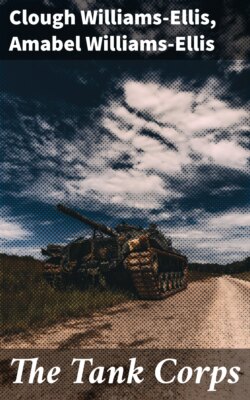Читать книгу The Tank Corps - Clough Williams-Ellis - Страница 13
На сайте Литреса книга снята с продажи.
II
ОглавлениеTable of Contents
But there were other than technical problems awaiting solution.
It would be difficult to over-estimate the difficulties which confronted those officers who were responsible for the preliminary training of the Heavy Section of the Machine Gun Corps; no one had ever actually fought inside a Tank, and it was, therefore, upon the spirit of prophecy alone that they must rely in their preparations. There was no manual to help them. They had, however, one very excellent official document, the secret Notes on the Employment of Tanks, which was issued in February 1916 (signed “E.D.S.”8), which gave an extraordinarily good forecast of what the rôle of Tanks would probably be when in action.
But the paper was very short and very objective, and was more concerned with an analysis of the place of the Tanks in the orchestra of battle than with the difficulties presented by their individual score.
This was where the training of the first Tank crew fell short—almost inevitably. Their teachers had a rather hazy mental picture of the actuality of battle. They did not squarely face the essential question upon whose answer all specific training and all specific preparation depend, the question, that is, “What is it going to be like?”
Thus, though they did teach most of the essentials, they left out half a dozen subjects of which an accurate knowledge was, as we shall see, ever afterwards held to be absolutely necessary.
One of their difficulties was the shortness of the time. What must the crews know? Would physical fitness or map reading prove more important when the day came? Signalling or esprit de corps? Visual training or revolver drill? There was no time for everything. There were, however, obviously three or four essentials. Most of the officers and men were already first-rate engineers or mechanics, but they must be trained exactly in the strange machine they were to use. They must understand the peculiarities of Tanks, and, if possible, of their individual Tank, the monster which they had to render animate.
They must be thoroughly at home with their Vickers guns, be accurate shots with them, be able to remedy all stoppages, and to strip their weapons with speed and accuracy. Above all, crews must train together, be accustomed to work under their officer, each with his special work as brakeman, gearsman, driver or gunner, but each still part of an organic whole. They must also attain to a certain physical level, must undergo some visual training, and must know how to fire a revolver.
All this and more was achieved, for the men were picked individuals of more than ordinary intelligence, and soon became extraordinarily keen on their work.
9“If anything went wrong with the Tank, they used to look upon it not as a bore but as a pleasure to put it right.... We felt a terrific pride in our Company and Section, and also as a Tank crew against other crews. There was always healthy competition, and this competition carried us right out to France.... Besides that, Tank Commanders had the very great advantage of training their crews themselves.... We knew our men thoroughly.”
But, as another Tank Commander wrote afterwards:
“The first Company to go out had to work at tremendous speed. The Tanks did not arrive till the last minute, and I and my crew did not have a Tank of our own the whole time we were in England ... as our Tank went wrong the day it arrived.... Again we had no reconnaissance or map reading ... no practices or lectures on the compass.... We had no signalling ... and no practice in considering orders. This was a thing I very much missed when I got out to France. When you work with a Division you get very long orders, and you have to analyse these orders to discover what concerns you and what does not.... We had no knowledge of where to look for information that would be necessary for us as Tank Commanders, nor did we know what information we should be likely to require.”
No one, in short, had sat down to imagine a Tank in action from within.
We had official painters in France, but alas! we had no official writers of prophetic fiction.
The history of the attack on Morval shows that this probably inevitable lack of, say, an official clairvoyant, this dependence upon methods of trial and error, though it ultimately did little to hurt the development of Tanks, did very much to prevent the Tank personnel from feeling satisfied by their début.
